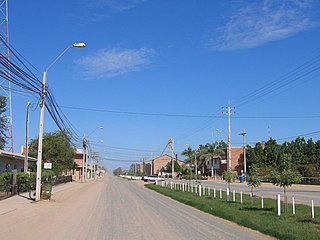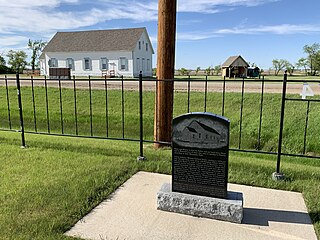Related Research Articles
Plautdietsch or Mennonite Low German is a Low Prussian dialect of East Low German with Dutch influence that developed in the 16th and 17th centuries in the Vistula delta area of Royal Prussia. The word Plautdietsch translates to "flat German". In other Low German dialects, the word for Low German is usually realised as Plattdütsch/Plattdüütsch or Plattdüütsk, but the spelling Plautdietsch is used to refer specifically to the Vistula variant of the language.

The Russian Mennonites are a group of Mennonites who are the descendants of Dutch and North German Anabaptists who settled in the Vistula delta in West Prussia for about 250 years and established colonies in the Russian Empire beginning in 1789. Since the late 19th century, many of them have emigrated to countries which are located throughout the Western Hemisphere. The rest of them were forcibly relocated, so very few of their descendants currently live in the locations of the original colonies. Russian Mennonites are traditionally multilingual but Plautdietsch is their first language as well as their lingua franca. In 2014, there were several hundred thousand Russian Mennonites: about 200,000 live in Germany, 74,122 live in Mexico, 150,000 in Bolivia, 40,000 live in Paraguay, 10,000 live in Belize, tens of thousands of them live in Canada and the US, and a few thousand live in Argentina, Uruguay, and Brazil.

Chortitza Colony was a volost, a subdivision of the Yekaterinoslav uezd within the Yekaterinoslav Governorate. During the times of Catherine the Great, the area was annexed by the Russian Empire after liquidation of the Zaporozhian Sich. It was granted to Plautdietsch-speaking settlers for colonization northwest of Khortytsia Island. The territory of the former colony is now split between the city of Zaporizhzhia and its adjacent Zaporizhzhia Raion, within Zaporizhia it is part of Voznesenskyi and Khortytskyi districts.
Molotschna Colony or Molochna Colony was a Russian Mennonite settlement in what is now Zaporizhzhia Oblast in Ukraine. Today, the central village, known as Molochansk, has a population less than 10,000. The settlement is named after the Molochna River which forms its western boundary. The land falls mostly within the Tokmatskyi and Chernihivskyi Raions. The nearest large city is Melitopol, southwest of Molochansk.

The Fernheim Colony is a Plautdietsch-speaking settlement of Mennonites originally from Russia of about 5000 in the Chaco of Paraguay. Mennonites from the Soviet Union founded it between 1930 and 1932. Filadelfia is the administrative center of the colony, seat of Boquerón department and is considered the 'Capital of the Chaco'.

According to a 2022 census, there were 74,122 Mennonites living in Mexico, the vast majority of which are established in the state of Chihuahua, followed by Campeche at around 15,000, with the rest living in smaller colonies in the states of Durango, Tamaulipas, Zacatecas, San Luis Potosí and Quintana Roo.
Alt Danzig was a German settlement in the southern Russian Empire, present-day Ukraine. Its name comes from Danzig, Gdańsk in present-day Poland. Alt, meaning "old", distinguishes this community from Neu Danzig, another German settlement in this area of the Russian Empire. The German colony Alt Danzig is also known as Old Danzig along with the existing local village of Karlovka were united in Krupskoe after the October Revolution in Russia.

Mennonites in Belize form different religious bodies and come from different ethnic backgrounds. There are groups of Mennonites living in Belize who are quite traditional and conservative, while others have modernized to various degrees.
Kleine Gemeinde is a Mennonite denomination founded in 1812 by Klaas Reimer in the Russian Empire. The current group primarily consists of Plautdietsch-speaking Russian Mennonites in Belize, Mexico and Bolivia, as well as a small presence in Canada and the United States. In 2015 it had some 5,400 baptized members. Most of its Canadian congregations diverged from the others over the latter half of the 20th century and are now called the Evangelical Mennonite Conference.

The Mennonites in Bolivia are among the most traditional and conservative of all Mennonite denominations in Latin America. They are mostly Russian Mennonites of Frisian, Flemish, and Prussian descent. As of 2013, there were about 70,000 Mennonites living in Bolivia; that population has grown to around 150,000 as of 2023.

Randolph, originally known as Chortitz, is a small community in the Rural Municipality of Hanover, Manitoba, Canada. The community has an estimated population of 70 and is located 1.6 kilometres north of Highway 52 on Provincial Road 206 about 11 kilometres west of Steinbach. Randolph is located within a half kilometre of the longitudinal centre of Canada.

Neubergthal is an unincorporated rural community and a National Historic Site of Canada in the Municipality of Rhineland, Manitoba, Canada. Neubergthal was founded in 1876 as a Mennonite community with Russian Mennonite settlers who came from the Bergthal Colony in Russia. The historic site encompassed six sections of land and the village was laid out in traditional long narrow farmsteads. The village is famous for its traditional Mennonite housebarns and other historic buildings.
Old Colony Mennonites are a part of the Russian Mennonite movement that descends from colonists who migrated from the Chortitza Colony in modern Ukraine near Zaporizhia to settlements in Canada. Theologically, Old Colony Mennonites are largely conservative Mennonites.
Dolynske is a village in the Zaporizhzhia Raion (district) of Zaporizhzhia Oblast in southern Ukraine. Its population was 690 in the 2001 Ukrainian Census. Dolynske is the administrative center of the Dolynske Rural Council, a local government area.
Los Jagueyes, also known as Quellenkolonie, is a Mennonite community in the municipality of Naimquipa, Chihuahua in northern Mexico that started with a group of Plautdietsch speaking Mennonites that bought the Los Jagueyes Ranch and immigrated from Manitoba, Canada in 1948.

The East Reserve was a block settlement in Eastern Manitoba initially set aside by the Government of Canada exclusively for settlement by Russian Mennonite settlers in 1873.
The Sommerfelders, also called Sommerfeld Mennonites or Sommerfeld Mennonite Church, are a Christian group.
Nehrungisch is a subdialect of Low Prussian, belonging to the Low German language variety. It was spoken in East Prussia and West Prussia, in the region around the Vistula Spit near Danzig. The easternmost locality where this variety was spoken was Narmeln, and it was spoken from Narmeln to Krakau (Krakowiec). Its Eastern border was to Mundart der Elbinger Höhe,a Low Prussian variety. The dialect survives in Chortitza- Plautdietsch, a dialect of Plautdietsch brought to Ukraine by migrants from the Vistula region. The distinguishing Chortitza features were present in the Northeast of the Vistula delta.
Kleine Gemeinde is a Mennonite denomination founded in 1812 by Klaas Reimer in the Russian Empire. The current group primarily consists of Plautdietsch-speaking Russian Mennonites in Belize, Mexico and Bolivia, as well as a small presence in Canada and the United States. In 2015 it had some 5,400 baptized members. Most of its Canadian congregations diverged from the others over the latter half of the 20th century and are now called the Evangelical Mennonite Conference.
The Vistulan dialect was a dialect of Low Prussian, which belongs to Low German. The dialect was spoken in West Prussia around Zarnowitzer See, Danzig and Graudenz. It had a border to Mundart der Weichselwerder. It is related to Nehrungisch.
References
- Schroeder, William. The Bergthal Colony. 2nd ed. Winnipeg: CMBS, 1986.
- Table 1. Compilation of Mennonite Villages in Russia, Prepared by Tim Janzen